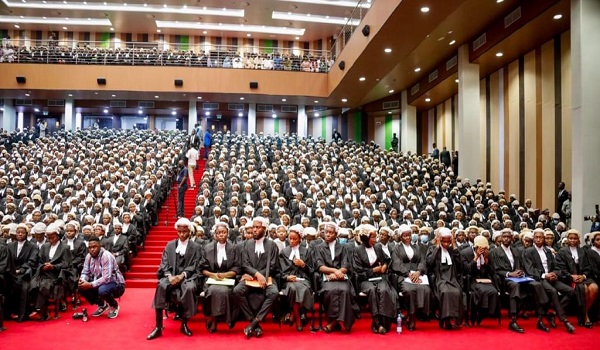Nigeria: Body of Benchers warns National Assembly against Law School proliferation
BOB Chairman, Chief Wole Olanipekun (SAN), gave the caution while admitting 4,711 new lawyers at the Call to Bar ceremony yesterday in Abuja.

The Body of Benchers (BOB) has cautioned the Nigerian National Assembly against making any legislation that will regulate the establishment of Law Schools in the country.
BOB Chairman, Chief Wole Olanipekun (SAN), gave the caution while admitting 4,711 new lawyers at the Call to Bar ceremony yesterday in Abuja.
He said: “May we plead with the National Assembly to stop toying with the idea of promulgating laws or amending the Legal Practitioners Act, to pave way for the proliferation of Law School campuses, particularly around the neighbourhoods of some lawmakers.
“It is within the exclusive prerogative of the Council of Legal Education, in consultation with the Body of Benchers, to establish new Law School campuses.
“While I do not question the jurisdiction of the National Assembly to make laws as appropriate, Law School campuses cannot be established without clearance from the Council of Legal Education.
“What we need now is the improvement and upgrading of the existing Law School campuses, using the newly commissioned Graham Douglas Law School Campus in Port Harcourt, built and equipped by the Rivers State government, as a model. I dare say that it is the best in the country for now.”
Olanipekun urged the new lawyers to always uphold the ethics of the profession and desist from acts that could portray the profession in bad light.
“It behoves me at this point to forthrightly prepare your minds for the inevitability of bumpy rides, aspersions, tirades, general vicissitudes, and such other contingencies to which all humans are susceptible.
“These eventualities are of universal character, sparing no one, irrespective of illustriousness or nobility of pedigree, tribal or ethnic affiliation, religious inclinations, affluence, eminence, or dexterity. Yours faithfully is, of course, a living example.
“Our profession boasts of, and parades three key words: noble, honourable and learned. Covet these flagship words in your endeavours, understanding and relationship with others.
“Do not engage in strife, blackmail, mudslinging, campaign of calumny, treachery or any attempt to run or pull anyone down,” he added.
The BOB chairman urged other experienced lawyers to improve on the welfare of new practitioners and spoke of plans to mentor new lawyers nationwide through a mentoring committee of the BOB, headed by J. K. Gadzama (SAN).
Olanipekun also urged judges to be lenient with young lawyers, saying: “To our noble judges, before whom these young ones will start appearing, please be patient with them and exercise your awesome power to commit, for contempt, sparingly.”
Dwelling on the activities of the BOB, the chairman stressed that the body is not an appendage of the Federal Government, or any other government, institution or agency, howsoever.
He added: “It is an independent and autonomous body, and its meetings, affairs and decisions are not influenced by any power or authority whatsoever.”
Olanipekun noted that although the Legal Practitioners Disciplinary Committee (LPDC), the body responsible for the discipline of lawyers, is a committee of the BoB, it is a juristic personality on its own, independent of the BOB, and is not controlled in any way or manner by either the body or its chairman.
The BOB chairman cautioned that proceedings before the LPDC should not be politicised, sensationalised, publicised and advertised in advance or while the proceedings are ongoing by complainants “for whatever reason howsoever, as so doing, negates the principle of fair hearing, which all lawyers subscribe to”.
The Director General of the Nigerian Law School, Professor Isa Chiroma (SAN), said the new lawyers successfully completed the vocational training at the school, as prescribed by the Legal Education Act of 1962.
Chiroma said the new lawyers were successful at the August/September 2022 Bar Final Examination. The DG said out of 5,802 students who participated in the examination, 4,711 were successful, representing 80.81 per cent pass.
A breakdown of the results showed that 119 students made First Class; 789 got Second Class Upper; 2,460 attained Second Class Lower; and 1,323 others made Pass; while 20 students were from the last exam.


